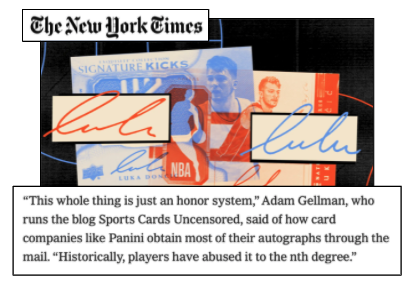Just wanted to take a minute, because this morning’s article in the New York times is a very important expose into an area of the hobby I have been screaming about for years. Apparently my screams were so loud that Jason Bailey, the author, reached out to get my take on the situation. Obviously my familiarity with the situation is understated, but my familiarity with the practices that could lead to inauthentic signatures being sold to the public in trading card form is extensive.
Here is what I didnt expect – the author had done research in a way that made me feel like he was coming from a place of knowledge. Not just knowledge, but understanding. Ive talked to a few reporters in the past, but this is the first time someone had come prepped with context and general familiarity beyond just reading a few articles online. Not only that, but Jason had talked to a bunch of people, most of whom are featured in the piece.
That’s not why this article is important, though. This article is important because for the first time in a very, very long time, there is genuine interest from the mainstream on trading cards. In addition to being exciting, this situation could and should be problematic for individuals and companies that have exploited the underbelly of the hobby for years.
It used to be that any shady dealings were swept under the rug, either by the hobby media or others, leaving the gross details to be hashed out in message board threads and blogs who werent beholden to the machine. Now, with some cards selling for prices that are akin to buying a house on the beach in California, the eyes are finally starting to open up to what has been going on for decades in the dark.
Ive said for many years that card industry people can be some of the worst people in any industry there is. Because the scale was always so small, but profits could be big enough to live a luxury life, too many keen students found ways to take advantage of the uninformed or the unindoctrinated. Even today, multi-million dollar sales go down regularly, selling cards that years ago I would have put smack dab in the middle of my weekly scam alert posts.
To think that we could go this long without some sort of federal interference is shocking. Sure, the government has raided NSCC shows, and eBay has finally banned well known shill bid aficionados, but there is so much that still needs to be addressed. A reckoning is likely already in process, and the fact that the NYT is dedicating its resources and talent to get to the bottom of it is refreshing and welcome.
For years, every card based story was how once booming shops or shows were now boring and dead, instead of focusing on the people who have made a career out of swindling or manipulating a naive population of collectors. Im not at all saying that Panini or Topps are in that bucket, but this venn diagram isnt two separate circles either. The article covers a few of the major scandals we have seen, but Panini and Topps both enable a cycle of abuse from the players that I hope is closed by Fanatics’ pending takeover.
Just a small example is covered here, with autograph signings being done through the mail instead of in the presence of a company employee. When authenticity is called into question, it takes a mountain of evidence to call out the misdeeds. Because the player signs the affidavit, and the player’s association stands firmly at their back, the players create a feedback loop between the accuser, the card company and their agents.
Basically, the card companies will go to the agents with the passive accusations from the hobby, not directly accusing them in most cases. The agent will go to the player or say they go to the player, who assures them the autographs are legitimate, regardless if that is true. The agent points to the affidavit, and the card company reports to the hobby that everything is kosher.
Its a situation where the punishment isnt even a big enough monetary situation for the athlete to care about the result of the investigation, either. If anything, for most athletes, avoiding autographs would likely be a relief rather than a punishment. The article even references this feeling clearly in a quote from people who know Luka Doncic and his regimen.
Sadly, sports cards and memorabilia has always been overshadowed by the felons and criminals that populate its midst, even if the ultra-majority of collectors and many industry people are nice and good people. I hope the NYT continues to shed light on these types of situations, unafraid that their piece will damage relationships with card company ad buys or free product from the manufacturers. This is what we need, and I am very happy to be a part of it.

